What Are the Best Uses of Time Travel in Video Games?
Great Scott! Check out the games that play nicest with the always-shaky rules of leaping through time.
This article first appeared on USgamer, a partner publication of VG247. Some content, such as this article, has been migrated to VG247 for posterity after USgamer's closure - but it has not been edited or further vetted by the VG247 team.
Since the beginning of time, humans have sought a way to permanently erase their past mistakes. So it's kind of a shame time travel is complete fiction, huh?
Thankfully, for all things escapist, we can turn to video games. And while time travel doesn't serve as the most common element in interactive entertainment, when done right, it can lead to some wonderful things. Below, you'll find a selection of games that make rewriting history a central mechanic, rather than just an excuse to throw characters into a sampling of outlandish backdrops (shame on you, Turtles in Time). These selections put the space-time continuum at our fingertips, making the simple act of playing God as satisfying as it should be. And if you can think of any prime examples this article neglects, feel free to mention them in the comments below. But please, be kind--this thing is being written in the primitive past, after all.
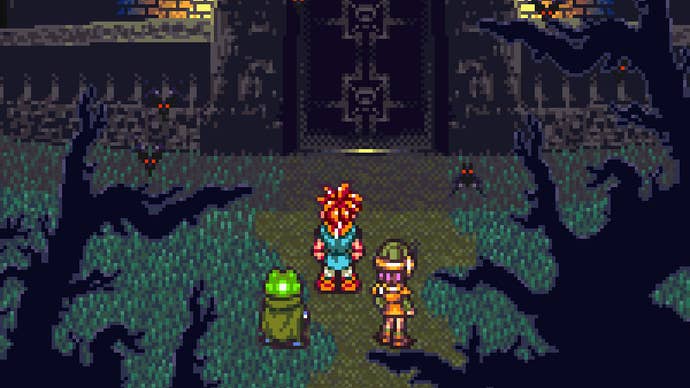
[Chrono Trigger - Super Nintendo - 1995]
Of course, no piece about time travel in games is complete without a mention of Chrono Trigger, so let's get this out of the way. 20 years after its release, Chrono remains one of the best games with time travel as its central premise--let's just say there's a good reason most of the games mentioned here came after this Super Nintendo hit. Square's 1995 RPG set the standard by making time-jumping vital to reshaping its world, giving the genre's typically static towns, castles, and dungeons a life of their own. With their trusty time machine, Chrono and the gang can commit altruistic acts like repopulating a forest, or saving a party member's mom from losing her legs--but they can also use this ability for the sake of greed by popping open special treasure chests, then returning to them once the contents have aged to perfection. The sheer number of ways Chrono Trigger plays with time travel makes it one of the best applications of the concept, even two decades later.

[Day of the Tentacle - PC - 1993]
Tim Schafer's first turn as director (alongside LucasArts chum Dave Grossman) took the point-and-click adventure game to some wildly creative places. As with its predecessor, Maniac Mansion, Day of the Tentacle lets players switch between multiple characters to explore a spooky house full of weirdos, but in this sorta-sequel, each of the three operates within a different era: Bernard in the present (well, 1993), Hoagie in 1776, and Laverne in the future. Most of the puzzles involve figuring out creative ways of helping your pals in other times, like freezing a hamster within an ice machine so it can help power a machine long after its natural lifespan, or fooling George Washington into chopping down a "cherry" tree to free a future friend from its leafy confines. These puzzles may sound a bit convoluted, but since Day of the Tentacle limits its world to a single mansion, experimenting with the rules of time travel never grows tedious.
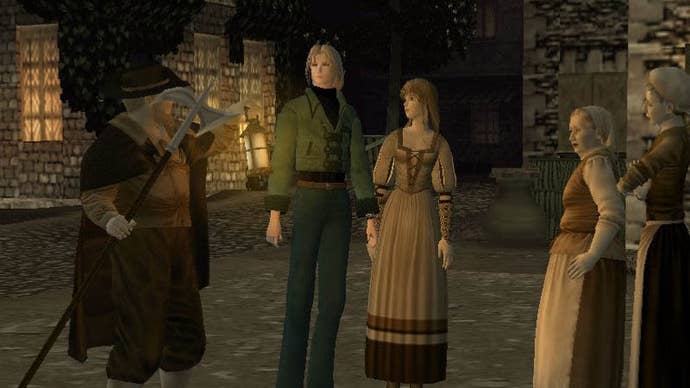
[Shadow of Destiny - PS2 - 2001]
This strangely compelling PS2 adventure by Konami has the protagonist using time travel for selfish, yet understandable reasons. Each chapter features main character Eike Kusch (he's incredibly German, you see) dying in a new, sometimes improbable way--often making him look like the unluckiest S.O.B. on the planet. But, upon his demise, he's able to relive this tragic day and attempt to stop these fatal events from playing out. Thankfully, Eike can also jump to specific spots in the past, where he can alter events to protect himself from the attacks of his mysterious killer. Some of the solutions are pretty obvious, like sticking an iron skillet down Eike's shirt to save him from a fatal stabbing, or tying a rope to the railing he's fated to be shoved over. Others, though, are a little more out-there: One chapter has Eike going back in time to convince a film director to make a better movie so more people will gather around its poster in the future--giving him a crowd of witnesses to keep his killer away. Whatever the deadly scenario, Shadow of Destiny certainly isn't lacking in creativity.
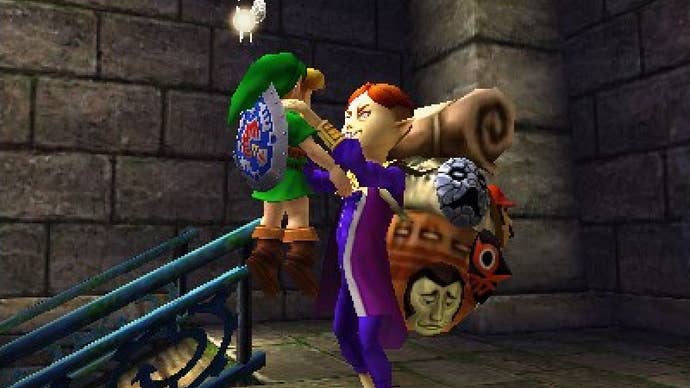
[The Legend of Zelda: Majora's Mask - Nintendo 64 - 2000]
Majora's Mask's use of time travel did much to alienate players who anticipated something a little less experimental from the Legend of Zelda series: This second N64 installment operates on a three-day cycle which concludes with a glowering moon colliding with the doomed land of Termina. Naturally, Link sets out to fix this lingering problem, even if most of his progress evaporates with every restart of the time loop. With the ability to relieve Termina's last three days countless times, though, Link can become incredibly familiar with the people around him (and their many problems) a la Groundhog Day. Unfortunately, no side-quest involves punching a Ned Ryerson-like character in the face.
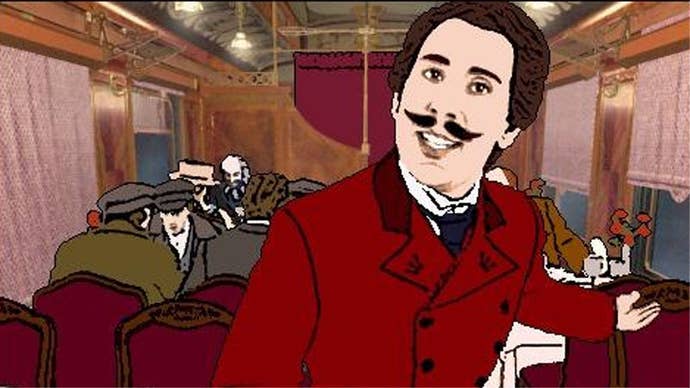
[The Last Express - PC - 1998]
Prince of Persia creator Jordan Mechner's 1997 magnum opus flopped hard due to the death of its publisher, which makes for one of gaming's greatest tragedies. Within the genre of point-and-click adventures, he just might have made the most ambitious one out there: The Last Express plays out in (kinda) real-time, with 30 characters moving and acting according to their specific schedules within the famed Orient Express. Since the cast doesn't wait for protagonist Robert Cath to make an appearance before playing out their scenes, much of the game involves being in the right place at the right time to absorb vital information via eavesdropping or the art of conversation. To assist him with his goal of getting to the bottom of an unfolding international conspiracy, Cath makes use of a special item that allows him to revisit the past in an instant. So, even though he can't be everywhere at once, thanks to the power of time travel, he's free to jump back in time to see if anything important happened in the train cars he didn't happen visit at that moment. And despite these multiple instances of time travel within a confined space, somehow, he never bumps into dozens of slightly confused past selves.

[Virtue's Last Reward - 3DS/Vita - 2012]
Virtue's Last Reward's predecessor, 9 Hours, 9 Persons, 9 Doors, centers around the concept of time loops: Each playthrough (hopefully) leads to a different ending, giving the player (and protagonist) vital information about reaching the true finale. Unfortunately, 999 didn't offer any real control over said time loops, and exploring different timelines simply meant starting over from square one. Virtue's Last Reward amounts to a much more playable experience, simply for the amount of control it gives players over the various timelines within the narrative. With the push of a button, VLR displays a map of scenes viewed so far, and allows players to jump to any of them on a whim. This method may be a bit more "game-like" than 999's strictly visual novel trappings--and doesn't make too much sense within the context of the story--but regardless, it's incredibly empowering, as any great time-travel game should be.
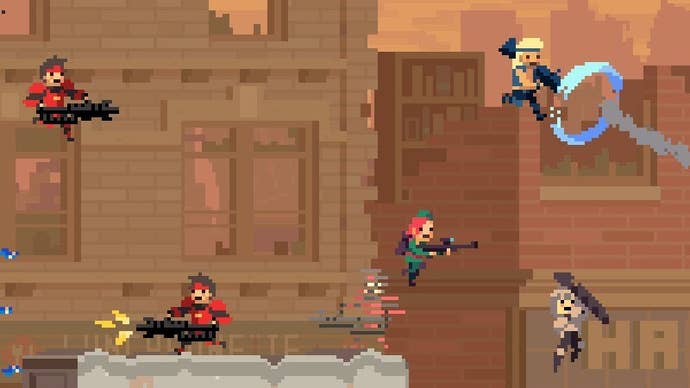
[Super Time Force - Xbox 360 - 2013]
Most of the games on this list have leaned more towards RPG or adventure-y genres, but Super Time Force takes a very shoot-em-up approach to the concept of time travel. On the surface, Capybara's creation might look like a simple homage to Contra and similar games, but the action plays out in a much more creative way. Die within a level, and you'll immediately be able to warp back to any point in the timeline you've created so far. This allows Super Time Force's heroes to save their own skin, but if they act fast enough, they can also take out the danger--or put up a barrier--to protect this past self from an untimely death. This idea plays out amazingly during boss fights, as it doesn't take long to have an army of recently deceased yous firing destructing waves of hot lead into some screen-filling monstrosity.

[Ghost Trick - DS -2010]
As with Shadow of Destiny, Ghost Trick uses time travel as a means of preventing death--but this time around, the protagonist isn't interested in saving his own skin. And there's a really good reason for that: He's dead! The recently deceased lead character Sissel, now in ghost form, witnesses a death play out in each chapter, though his spirit powers give him a major advantage: They allow him to jump back mere minutes before the bucket-kicking moment. Playing Ghost Trick involves becoming intimately familiar with the events of these contained scenarios as Sissel jumps from object to object in an attempt to set things right. And, just like in any good time travel game, he can jump backwards in time for a second try if he makes a crucial mistake. If anything, Ghost Trick gets extra points by creating its own rules for time travel in the spirit world, then building upon these restrictions gradually to make later levels a lot more complex. (You'll never view pomeranians the same way again.)
[The Legend of Zelda: Ocarina of Time - Nintendo 64 - 1998]
The revelatory Ocarina of Time used A Link to the Past's extremely inventive light world/dark world formula, but with a twist: This creepier version of Hyrule didn't exist as another dimension--it was the kingdom's future. Link's time-travelling powers kind of pale in comparison when compared to some of the other characters on this list, since he can only jump ahead seven years, or back to the present. And with his puny, child body, incapable of wielding the Master Sword, Link's actions in the "past" can't do much to save Hyrule from its dark future. Even so, this altered version of the typically colorful fantasy world offers some great incentives to explore, if only to see what happened to the citizenry during Link's seven-year slumber. But how do these events play into The Legend of Zelda's largely arbitrary timeline? Only the most devoted Hyrule Historia readers know for sure.
